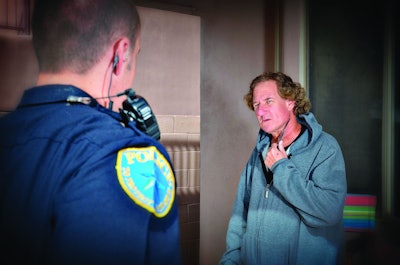 The Supreme Court recently overturned the Ninth Circuit "provocation rule" in which the circuit court allowed liability for excessive force when an officer "intentionally or recklessly provokes a violent confrontation." However, the Supreme Court did not foreclose liability for improper tactics or injuries proximately caused by other constitutional violations. County of Los Angeles v. Mendez, 137 S.Ct. 1539 (2017). Photo: Police File
The Supreme Court recently overturned the Ninth Circuit "provocation rule" in which the circuit court allowed liability for excessive force when an officer "intentionally or recklessly provokes a violent confrontation." However, the Supreme Court did not foreclose liability for improper tactics or injuries proximately caused by other constitutional violations. County of Los Angeles v. Mendez, 137 S.Ct. 1539 (2017). Photo: Police File
What legal duty and liability risks arise in calls for police intervention in non-criminal mental health incidents, and particularly with persons threatening suicide? These calls may come from business owners irritated by an apparently homeless person walking back and forth in front of the business, mumbling or acting out; a mentally ill person calling the police for personal crisis intervention; or from a family member or domestic partner worried about a loved one who is armed and threatening suicide. Business owners can be frustrated. Community members may fear someone acting bizarrely in public. Family members may simply be desperate for help and not know where else to turn.
Cops know that calls involving suicidal persons can quickly turn from suicidal to homicidal. Suicide by cop, or law enforcement-forced-assisted suicide, accounted for as many as 11% of all officer-involved shootings in a 10-year study in Los Angeles County. Over half of the law enforcement-forced-assisted suicide subjects brandished firearms or realistic facsimile weapons.
What is an officer's legal duty to intervene? Can the officer minimize legal liability risks? Could an officer lawfully refuse to intervene?
There is no doubt that calls for police to solve mental health crises are increasing and that community resources are scarce, particularly emergency treatment resources. This article doesn't begin to tackle the many complicated questions about that challenge. This discussion is limited to exploring the legal questions forced upon street cops by these calls.
What Are We Trying to Accomplish?
Traditionally, America's police have met the mission to protect and to serve by responding to almost any call. For example, a person calls a family member, tells the relative that he's had all that he can take and that he has a gun and is about to kill himself. Panicked, the family member calls the police to contact their loved one and to intervene in the possible suicide effort. Police respond, knock, and call out to the subject. He shouts at the officers to leave him alone. Alerted by the relative who got the call, other family members drive up. What happens next?
If the police response involves forcing entry and attempting to take the potentially armed, suicidal subject into custody, do officers have legal authority to cross the threshold of a private home? Concerned that her former sister-in-law, Sandra Roberts, wouldn't answer the door, Tracey Huckabee called the Sheriff's Office for a welfare check. Huckabee told the deputy that Roberts lived alone, "had a history of suicide attempts," and was "on medication for bipolar disorder."
The deputy knocked several times on the front door and a window. He next knocked on the kitchen door and then the back door. The deputy heard the television inside the home. He opened the back door by a few inches, and looked inside. Roberts had been inside all along, ignoring the knocking.
Roberts shouted at the deputy, telling him, "Get the f--- out of my house!" After unsuccessfully trying to calm Roberts, the deputy took her by the arm and pulled her from the door and into the garage. He explained to Roberts his reason for checking on her welfare. Roberts continued to yell at the deputy and Huckabee. The deputy told Huckabee that he couldn't take Roberts for an evaluation because she didn't threaten suicide in his presence.
Roberts sued for the deputy's warrantless entry (by just barely reaching in the back door) into her home. The court held that the deputy's intrusion on Roberts' home was proper. Although a private home is protected from warrantless intrusion under the Fourth Amendment, the exigent circumstances doctrine justified the entry. "Police may enter private premises and conduct a search if 'exigent circumstances' mandate immediate action. [E]mergency situations involving endangerment to life fall squarely within the exigent circumstances exception." Roberts v. Spielman, 643 F.3d 899 (11th Cir. 2011).
The exigent circumstances doctrine permits warrantless entry when there are both exigent circumstances and probable cause. The probable cause requirement may be met where officers reasonably believe a person is in danger. Even then, the warrantless entry or search must be strictly limited to addressing the exigent circumstances presented.
One court explicitly rejected the notion that officers have a duty to prevent a suicide.
Is An Officer Required to Act?
Officers should remember that any decision to rely on exigent circumstances to enter a home will be painstakingly scrutinized after the fact. Consider whether choosing to tactically withdraw may be the wiser course. Many officers mistakenly believe that the law does require a cop to act. Not so in most cases. In a case where a mentally ill man died after a TASER deployment and physical grappling to apply handcuffs, one judge suggested that the officers could have simply done nothing. Judge Wilkinson wrote, "law enforcement will learn soon enough that sins of omission are generally not actionable."
Occasionally, officers are held liable under the theory of "state-created danger." If an officer acts (or doesn't act when a reasonable officer would act) and the act (or omission) exposes a person to a greater danger than before the officer's action, there is a risk of liability for "state-created danger." A common example could involve arresting a driver, impounding the car, and leaving vulnerable passengers to fend for themselves late at night in dangerous conditions. Or an officer might make a promise and a person relies on the promise and is injured. The following case is an example of detrimental reliance on a promise that led to potential liability.
 Once officers decide to intervene, they may be liable for tactical decisions. Photo: Getty Images
Once officers decide to intervene, they may be liable for tactical decisions. Photo: Getty Images
At the time of James Henderson's incarceration in a county jail mental health unit, his parents asked that he only be released to an in-patient secure mental health facility due to his diagnosis of profound mental illness and his repeated threats toward them. Officials assured the parents that Henderson would be placed in a facility and that the parents would be notified of his release from jail. Allegedly, no alert of his release was ever made.
After being released, Henderson murdered his parents. The court ruled that the parents may have been "placed in a more dangerous position when the County promised to alert them to James's release and then failed to do so." Henderson v. County of Santa Cruz, 2015 WL 225429 (N.D. Cal. 2015).
Do Officers Have a Duty to Prevent Suicide?
Even more direct than Judge Wilkinson's caution that "sins of omission" don't create liability is one court's explicit rejection of the notion that officers have a duty to prevent a suicide. Adams v. City of Fremont, 80 Cal.Rptr.2d 196 (Cal. App. 1998). However, once officers decide to intervene, they may be liable for tactical decisions.
A neighbor called to report screaming next door. When deputies arrived, Shane Hayes' girlfriend told them that Hayes had tried to kill himself earlier in the evening by sucking car exhaust. She said that Hayes had tried to harm himself on other occasions, and she was concerned for his safety. The two deputies decided to enter the house. They found Hayes in his kitchen. Hayes advanced toward them with a large knife in his raised hand. Both deputies fired and Hayes was killed.
Hayes' daughter sued, claiming that deputies were negligent based on their tactical decisions prior to the shooting. The California Supreme Court held that the officers could be held liable for allegedly precipitating the circumstance that caused the deputies to shoot Hayes. Hayes v. County of San Diego, 305 P.3d 252 (Cal. 2013). Thus, in a situation where doing nothing—even if that meant that Hayes
killed himself—would almost certainly have meant no liability, the officers now face legal exposure for their tactics in trying to prevent Hayes' suicide.
Can An Officer Just Tactically Withdraw?
What initially seems like an emergency may well be a situation affording time to seek a warrant, or perhaps a court order for mental health evaluation. Todd Hastings called a counselor and said that he was thinking about committing suicide by running a hose from his truck into his home. The mental health center contacted 911 and deputies were dispatched for a welfare check. When deputies arrived, there was no hose running from the exhaust to the house.
Hastings answered the door when deputies knocked. He was agitated and nervous. He admitted that he had told the counselor that he was thinking about suicide. The deputies asked him to step out to the porch and speak with them. Hastings said that he wanted to get his shoes. He tried to shut the door and one of the deputies stuck a foot in the door.
Hastings ran into a bedroom and shut the door. The deputies followed. Hastings picked up a long sword. He briefly held it toward himself, as if to stab himself. Hastings then lowered the sword and spoke into the telephone. One of the deputies sprayed pepper spray, hoping to distract Hastings. Instead, Hastings turned toward the deputies and advanced with the raised sword. The deputies fatally shot Hastings. Hastings v. Barnes, 252 Fed.Appx. 197 (10th Cir. 2007).
The court denied qualified immunity, leaving a jury to decide whether the deputies improperly escalated the situation and precipitated the force. In similar circumstances, what would you do? Was there time to obtain a warrant? Or to consult with the counselor who called and perhaps get a commitment order? What about tactically withdrawing?
What does tactical withdrawal look like? How is that different than doing nothing and just walking away? Tactical withdrawal implies tactical thinking and decision making. First and foremost, do no harm. Don't make the situation any worse by either creating a legal duty or by precipitating force through ill-advised tactics.
 The harsh truth is the subject may harm himself after police leave. Photo: Getty Images
The harsh truth is the subject may harm himself after police leave. Photo: Getty Images
Ask: "Why are we here?" "Is this a criminal or non-criminal situation?" "Do we have authority to force entry or custody?" "What do we hope to accomplish with force?" Tactical withdrawal requires the harsh recognition that the subject may harm himself after police leave.
Don't create a legal duty. The police presence will likely attract the attention of the neighborhood. When tactically withdrawing, invite any bystanders to call police if something else happens or if they have further cause to worry. Don't make promises that you can't keep or statements that may not be true, such as assuring neighbors that "it will probably be all right."
What's Legally Appropriate?
Not every problem that complainants bring to the police is really a police problem. There just isn't always a police solution and generally there isn't a police duty to try to solve the problem. When confronted by a mentally ill person who isn't committing a serious crime and isn't an active threat to anyone else, the most challenging response may be to not engage, or to withdraw. It may seem like a "sin of omission," but it will often be the most legally appropriate response.
Ken Wallentine is an attorney and retired police chief. He is currently a special agent for the Utah Attorney General and the senior legal advisor for Lexipol.







